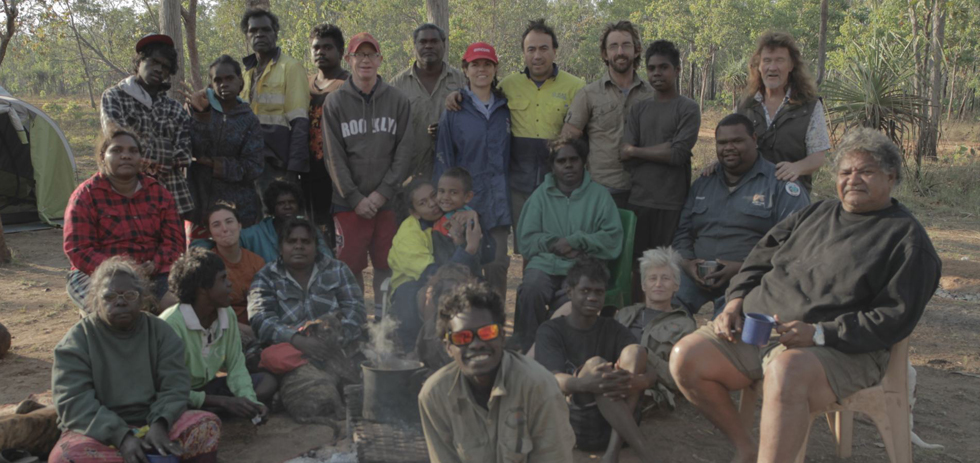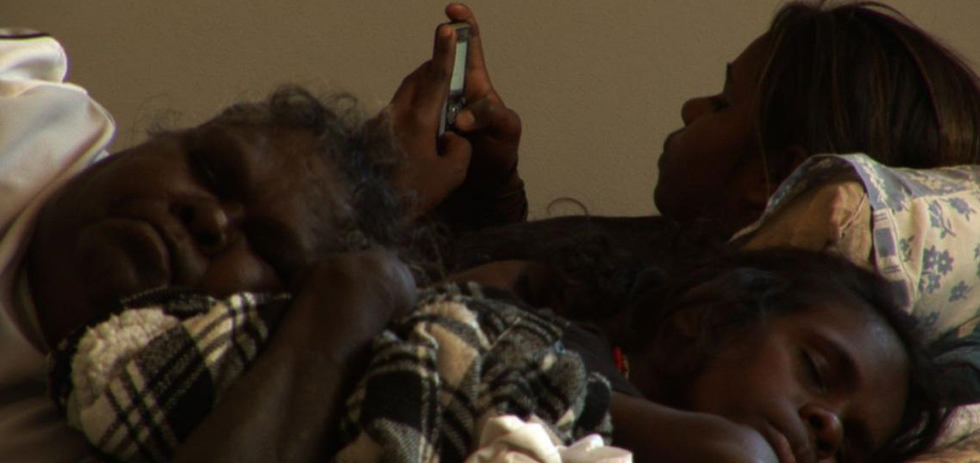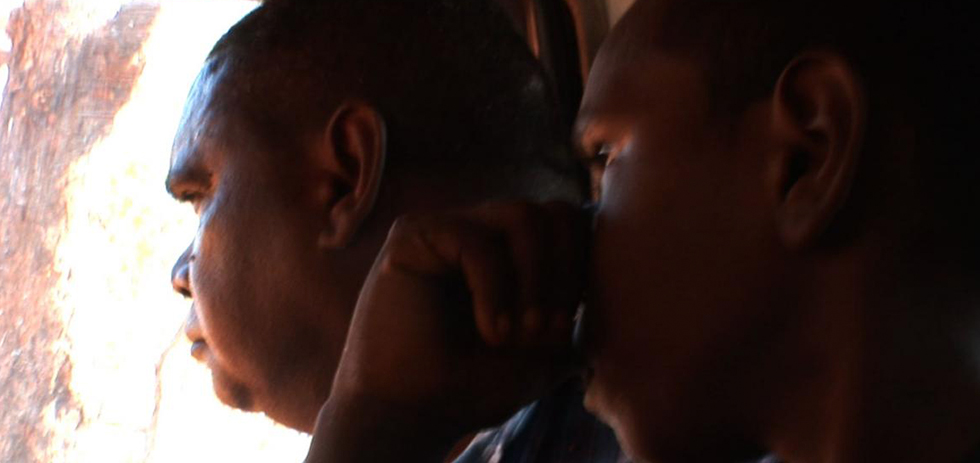The Karrabing Film Collective describe themselves as a “grassroots Indigenous based media group” with their work focused on portraying and analysing social and political issues facing their communities. At Melbourne International Film Festival, the collective are screening a selection of shorts – from 2014’s When The Dogs Talked, to their latest work Windjerrameru, the Karrabing Film Collective offer one of the most needed perspectives in Australian cinema. From the looks of it this is just the beginning. We caught up with the collective at Melbourne International Film Festival to discuss the two shorts and their future as a group.
I wanted to start by asking how the Karrabing Film Collective got started, how all of this came together?
Elizabeth Povinelli: That first question, how it is that we all know each other…
Gavin Bianamu: Well, my dad had a dream about it – about making films.
Rex Edmunds: Karrabing means “low tide turning”, the ocean turning back out.
And who is in that Karrabing – it’s a broad group, right?
Rex: Karrabing, it’s like we’re growing up in a big family group, with different families and tribes in our area, from around the coastal areas.
So how did that move from being a group that knew each other to a collective involved in making these films?
Rex: We were homeless and we’d sort of moved out from the community; and we’d all stick together and move out to the bush. We decided to make a film that we decided was going to be about us. We started cooperating with each other and everyone started feeling happy about it and we just kept going with it.
Povinelli: So it was 2007 and right before the Intervention there was a bit of a riot at the community where everybody was born and grew up – and where I had been since 1984. So everyone who is now in Karrabing… left; And that’s when when we’re sitting at the beach thinking about what word would fit us all together.
So that’s where the word Karrabing comes in?
Rex: Yes, it means people getting together; bringing in different tribes and languages in the area together.
The latest film Windjerrameru is screening alongside the older film, When The Dogs Talked at Melbourne International Film Festival. What inspired the latter film? Was it a direct response to the intervention at the time?
Rex: Yeah, that’s what was happening. We were having a problem with the public housing. It usually happens mainly in Darwin, in the suburbs…
Povinelli: Like in 2007, when the riot happened, we weren’t in intervention yet. So the problem was solved with them saying “oh, you can go back to your country and we’ll give you jobs and build you houses” – that was private intervention – then two months later, right afterwards, it became: “now we’re not giving you any money, you all need to move to the city and give a job”. But there’s no housing. How long do you have to wait for housing?
Rex: Two years? Nearly three years. In our group there was one person who got their house then we had to wait for another year, so we were all sort of camping up in one house in Darwin. All our families in a small little unit flat.
Povinelli: And then in the bush we’re trying to get that GPS thing going, but there’s no support. So where they say “oh you should do this or that” they don’t think ‘with what’.
The interaction with traditional culture in the When The Dogs Talked is so evocatively placed to be in tension with the house plot – there’s always this sense of on screen comfort once the group have left the house and such chaos when they’re in it – only shown in the consecutive visits from the housing inspection. Did you intend for it to come out like this?
Rex: When we out in the bush we are relaxed, we go out and do things. Then in the town it’s like… you get people complaining, there’s too many people crowding up the house and you get the housing person comes in and tries to kick you out for overcrowding. Then you’ve got to ask for a few weeks, then they come back and you have to move, or hide… go in the long grass or something.
Povinelli: You know that the police can just walk into people’s houses? No anything. They just walk in and if you’re sitting there… how much is that fine, for an open beer – $180?
Rex: $180
Povinelli: $180 for one beer. You think how much you’re getting a fortnight… 200 hundred a fortnight, that’s your whole pay and 180 that’s your fine. And if you don’t pay that fine, you end up in jail. You get locked up for being poor, and you get locked up for being in your house drinking a beer. One guy got 800 for driving down the shops unregistered just to get some food. That’s what this film is really about, you know?
Gavin: And us young kids, young adults now some of us. They’ve been getting in trouble with the law, and acting up as a result of these circumstances.
I feel like the latest film Windjerrameru moves to towards that – really focusing in on the effects of these policies –
Gavin: There’s actors that are like in real life, and we have some idea about the movie and we talked to Eliza about them.
Povinelli: Then Gavin, Kelvin, and the others. They came up with the idea that there’d be miners and rangers and we went with that.
I think a really interesting way about how it comes across is the documentary nature of it all, how it’s revealing these truth; but with these dramatised stories that are so compelling.
Rex: We’ve got all sorts of different communities around Australia and we want people to see the film and know what’s happening. People know that happened to their community and every other community.
Povinelli: But if you put a bit of a story on it… one of the things we talked about is if you do a documentary, people look at it in a certain way. If you put a bit of a story on it, make it a bit funny with a seriousness underneath, the audience are tricked into going along. They think it’s a story, then they realise… “oh wait, this is real.” So it’s not documentary, but it’s very close to reality.
I thought it was great how when these serious issues were being presented never had dramatic music over the top or any kind of framing of the issues in a way that positioned the audience to perceive what was happening on screen in a certain way. It was very honest, and I think that made it as affecting and evocative as it was.
Povinelli:Well that’s very Karrabing. We’re like that… we’re serious and we go bush and we got jobs and get kids to school, but sometimes we’re very… it’s like the Beatles. But yeah, it’s very serious.
I think one of the things I’ve noticed, is how the films are particularly snapshots of certain issues, do you ever seek out to make films about certain issues or is it more a matter or looking at certain stories and ideas?
Povinelli: We just say “what is the next movie we want to make?” So if you dig into a life, that story is going to reflect what’s happening right now, it’s like it’s going to find a snapshot anyway, and we’re going to understand what’s happening through the making of the movie anyway.
I was curious as to how the collective operates on an international level and I’ve seen interest from places like e-flux (located in New York).
Gavin: My dad had a dream about making movies, he said “I wanna be a movie star.” So we started the Karrabing gang, and we wanted to do sound, we wanted lighting and we wanted to act.
Rex: He calls himself Elvis, and he wants to go to Graceland and he wants to be a movie star like Elvis.
Povinelli: So me, because I’m… my paying job where we make money to do these films is in New York, so I know a lot of filmmakers. So then we decided that each film we’d bring in someone from outside Australia to give it an international link. So the first one was Liza Johnson, who’s a director, she made Elvis and Nixon and David Balker who’s a director and editor, and then that e-flux mob I know… I first taught one of the people who started it – Juliette Aronda – and then through me, ’cause I’m always talking up us, they going onto this. But yeah, having international connection is fantastic and we make them come.
Rex: And one thing… I think we should make the next movie somewhere in the big city.
What’s next for the Karrabing Film Collective?
Rex: This is my fourth in Melbourne, I’ve come here to watch a couple of footy games. I’d like to make a movie out here. Have a couple of shoots out here.
Povinelli: Right now we’re making a film with an iPhone…
Gavin: Yeah, an iPhone 6.
Povinelli: We’ve had Ian Jones. Ian Jones was the cinematographer for the second half of Dogs and all of Windjerrameru. We make these films off no money, and Ian Jones has been really great. He’s come out, camped with us and that was really great – but now we’re thinking… why not experiment a bit and we’re trying to iPhone 6’s. But with the this decision making we do it all together, and we stress out together and we push each other.
Rex: Our boat broke down and we were off in the bush, out looking for a waterhole.
Povinelli: 500km or something from Port Key, and we’re in a big bay with a boat broke down.
Rex: And then we waited for them in another little creek.
Povinelli: We asked the white guy for water, he was drinking water… “no water” they told us. Anyway, the film is about why the motor turned off. My sisters always wanted to get the Jesus part of it in… so in this story half of them think the motor broke down because the saltwater, half of them think the ancestors did it, and then Linda thinks we should all pray to on top. So it’s got all the different perspectives.. We even go back and forth and go back into time and ask the ancestors “did you break down the motor in the future?.
That sounds fascinating. Thank you so much for your time.


